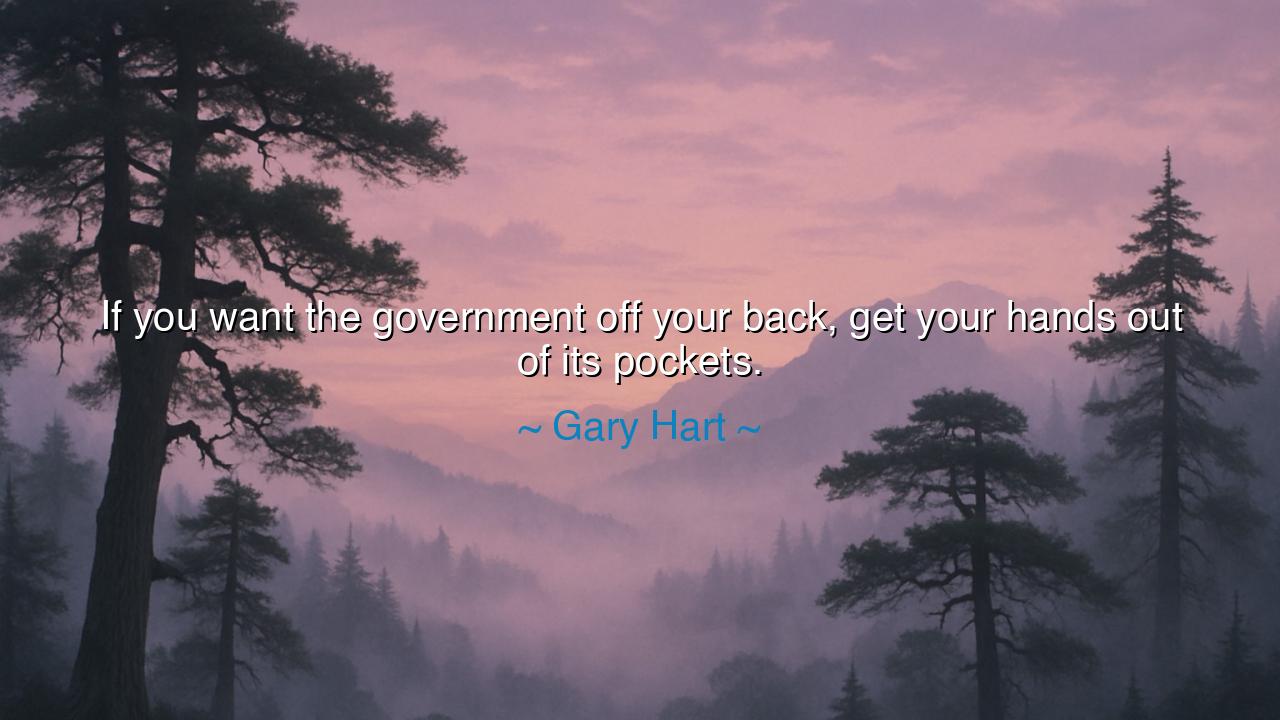
If you want the government off your back, get your hands out of






The words of Gary Hart ring with the austere clarity of moral truth: “If you want the government off your back, get your hands out of its pockets.” In this single sentence lies a profound reflection on the balance between freedom and dependency, between the citizen’s right to liberty and the citizen’s duty to self-reliance. Hart, a man of politics and principle, speaks not with cynicism but with conviction—that one cannot demand the fruits of freedom while sowing the seeds of dependence. His words are a mirror held to society, revealing how often we curse the burdens of government even as we lean upon its crutches.
At its heart, this quote is a meditation on responsibility. It reminds us that every liberty has a cost, and that cost is personal accountability. A free people cannot forever demand assistance, subsidies, and protection from the very government they resent. For every coin taken from the public treasury, there comes a thread of control—subtle at first, then binding. The paradox of modern freedom is that many cry for the state to leave them alone, even as they reach for its wealth, its programs, its privileges. Hart’s wisdom teaches that one cannot serve two masters: the spirit of independence and the habit of entitlement cannot dwell in the same heart.
Throughout history, nations have faced this tension between self-reliance and dependency. Consider the rise and fall of the Roman Republic. In its early days, citizens prided themselves on hard work, thrift, and civic duty. But as Rome grew rich, its people grew complacent. The government began to distribute free grain and entertainment to appease the masses—the infamous panem et circenses (“bread and circuses”). What began as charity became expectation; what began as generosity became chains. The citizens who once ruled themselves became subjects to the state’s bounty. Thus, liberty eroded not through conquest, but through comfort. The more they took from the state’s pocket, the heavier the state’s hand became upon their backs.
Hart’s message warns against this same decay in modern form. He speaks to the citizen who demands tax breaks yet complains of public debt; to the business that seeks government aid yet condemns regulation; to the people who call for independence while living on subsidies. Government grows not from tyranny, but from demand—from every plea that says, “There ought to be a law,” or “There ought to be a program.” Each of these demands adds another layer to the state, another link in the chain. The weight upon our backs is the sum of our own requests, not merely the ambition of our rulers.
But the quote also carries an invitation to virtue. It calls us to rediscover the ancient dignity of self-sufficiency—the strength that comes when men and women provide for themselves, build their communities, and take responsibility for their own lives. The pioneers who carved civilizations from wilderness did not wait for decrees or grants. They forged their fate with their own hands, guided by faith and perseverance. This is the spirit Hart seeks to awaken: the spirit of those who, instead of blaming government, reform themselves; who, instead of demanding more, give more; who understand that the surest way to weaken tyranny is to need it less.
The moral at the core of this saying is both simple and severe: freedom cannot exist without restraint. To have the government “off your back” means to live in such a way that you do not need it to hold you up. It means cultivating virtue instead of dependence, courage instead of complaint. The freest societies are not those with the most benefits, but those whose citizens carry the weight of their own responsibilities with honor. For the price of liberty is not paid in words or votes, but in daily acts of integrity and self-reliance.
So let the lesson be clear: to live freely, live responsibly. Do not take from the state what you can earn yourself. Do not trade autonomy for comfort, nor conscience for convenience. Build, create, contribute, and strengthen the world with your own hands. When a people cease to feed on the wealth of others and begin to generate their own, they no longer need the government to carry them—or to control them. Thus, the path to freedom lies not in rebellion alone, but in maturity. As Hart teaches, when we remove our hands from the government’s pockets, we lift its weight from our backs—and stand, finally, as the masters of our own destiny.






AAdministratorAdministrator
Welcome, honored guests. Please leave a comment, we will respond soon